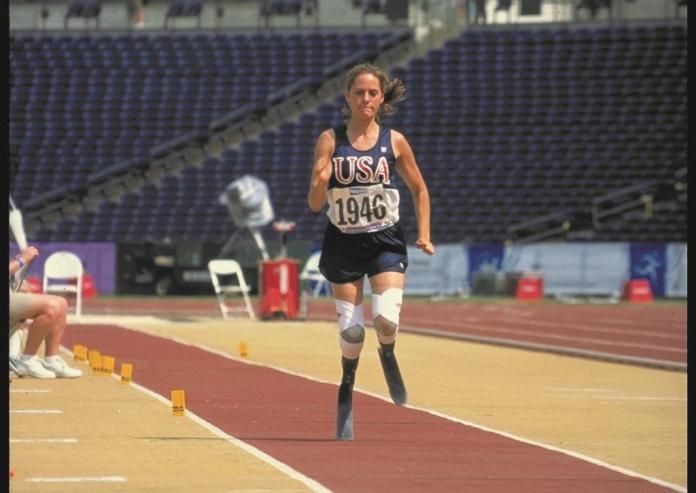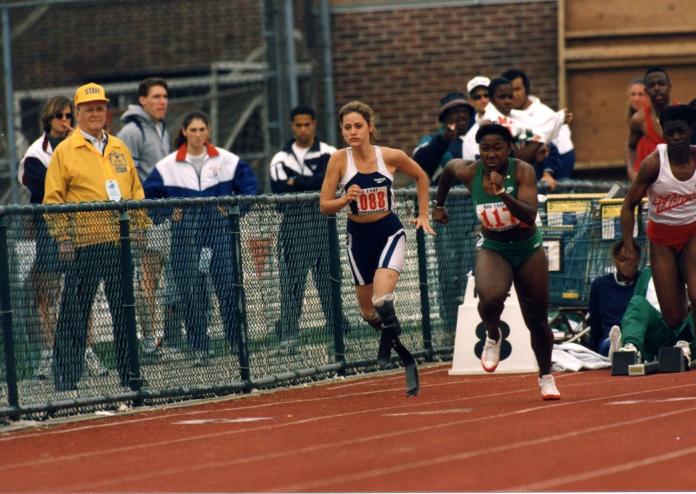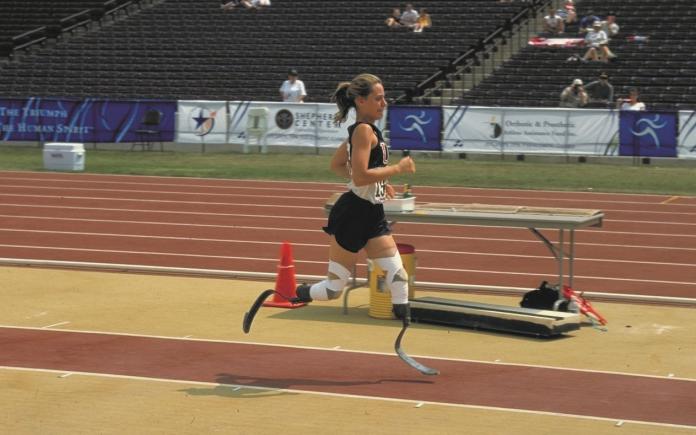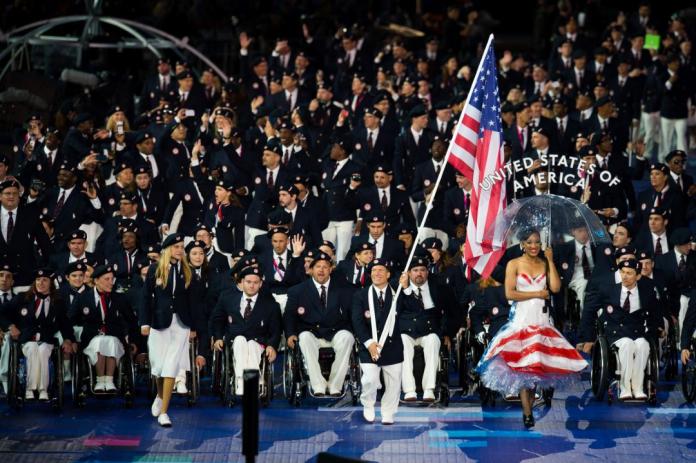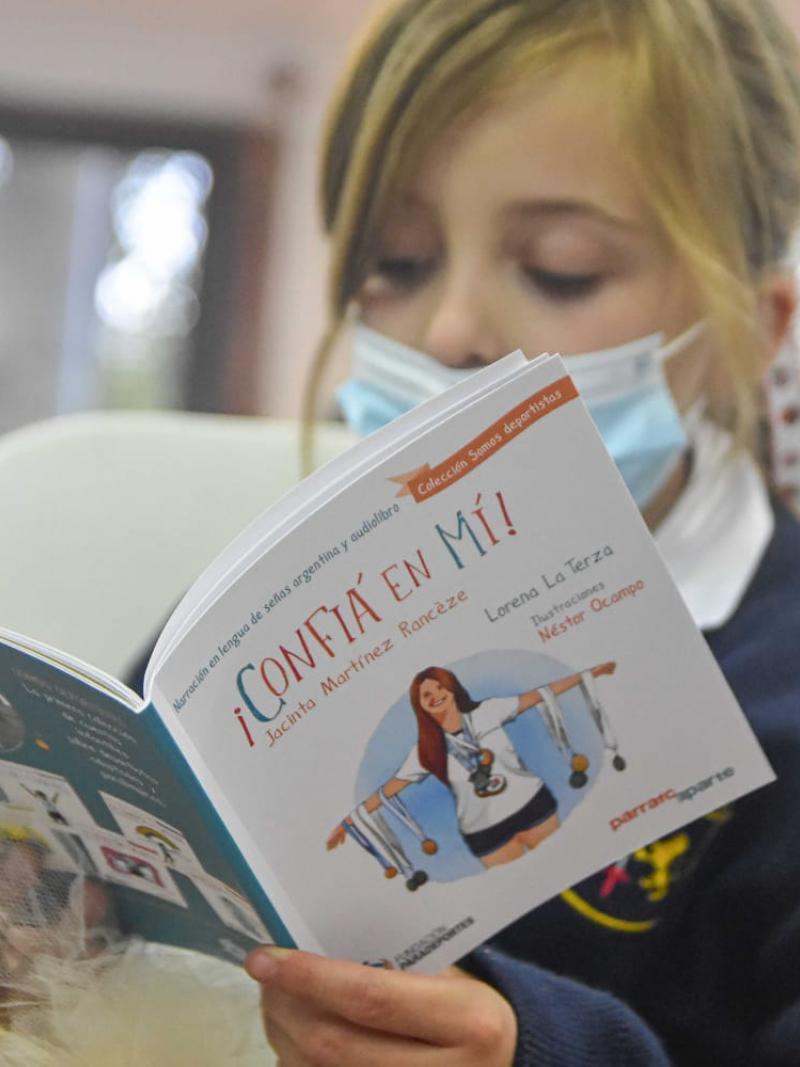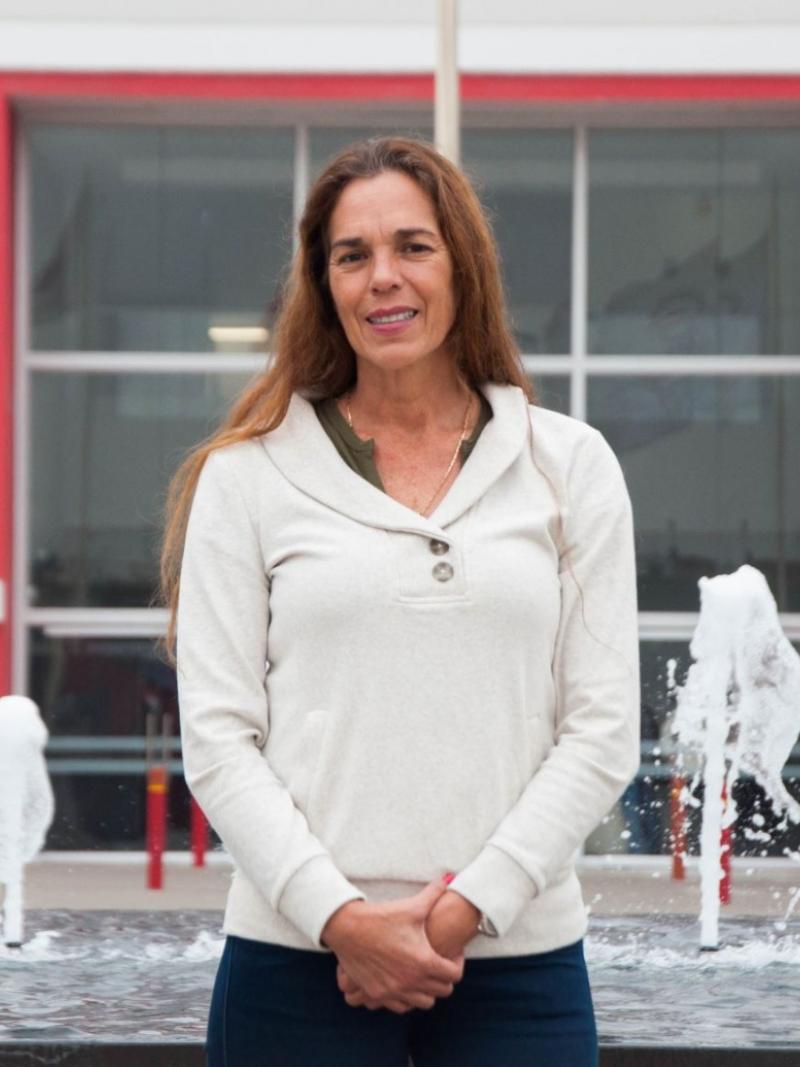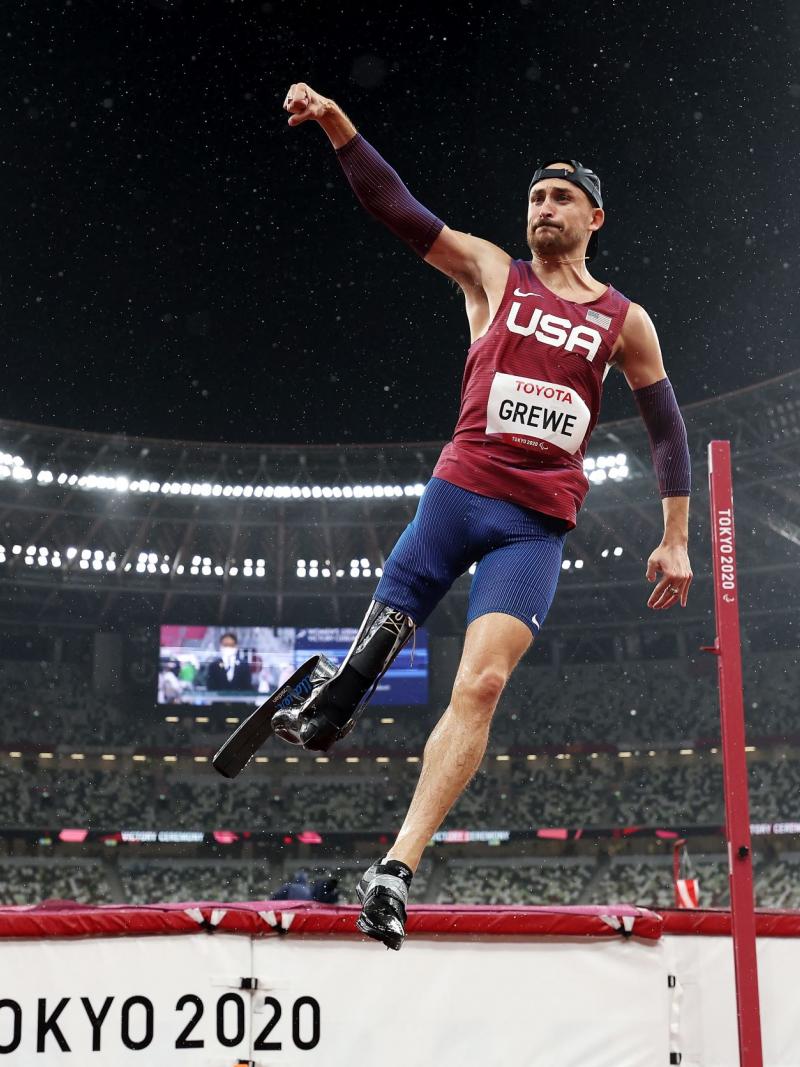Aimee Mullins: from Atlanta 1996 prosthetics pioneer to star in Stranger Things
Aimee Mullins reflects on pursuing her dreams and making the multi-award-winning Netflix show 22 May 2023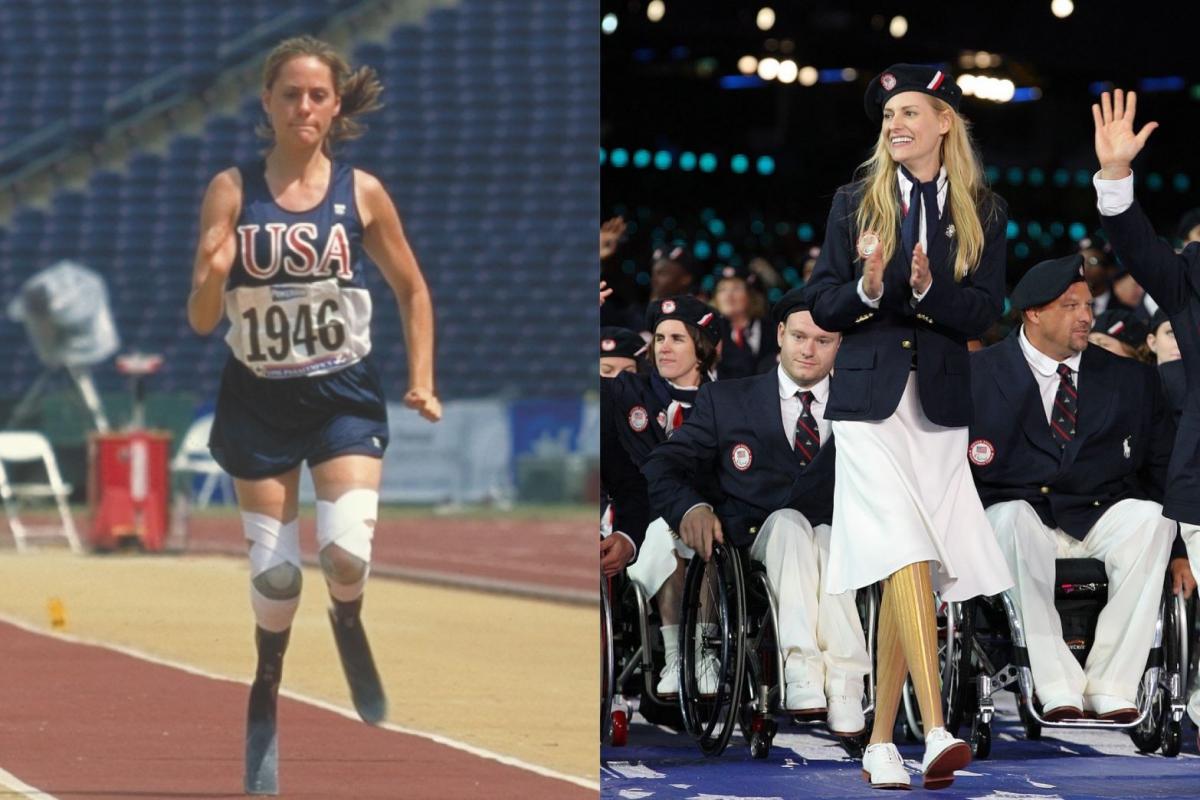
Aimee Mullins has done it all: from prosthetics pioneer at the Atlanta 1996 Paralympic Games, to modelling, public speaking, and acting in one of Netflix’s biggest global hits.
The 47-year-old former sprinter and long jumper is a shining example that nothing is impossible for Paralympians beyond sport.
Love for sport
Born in Pennsylvania, USA with a medical condition that resulted in both her legs being amputated below the knee when she was a baby, Mullins enjoyed an active childhood.
"There are definitely kids who shy away from physical activity but that wasn't the case in the family that I grew up in," she said.
"My immediate family is only two brothers and my parents, but my mom has 10 siblings and my father has five, so we were a big family and I saw my cousins multiple times a week.
"Everybody played. When we would get together it would just be grabbing a plastic baseball bat and immediately picking up a game in the street, or we would make up games, and just run around.
"I remember things like Easter, holidays, and I would be looking nice, having a dress on with stockings, and it didn't last 20 minutes,” Mullins recalled. “I loved being physical, and most of my cousins around my same age group were all boys. They didn't take it easy on me. It wasn't like, 'Oh, Aimee has prosthetic legs, you have to treat her differently.'"
'Off to the races'
Growing up in pre-internet times, Mullins never met other amputees in her childhood. But in her first year at university, she shared a room with Sarah Reinertsen, a left-leg amputee who had competed for the USA at the Barcelona 1992 Paralympic Games.
"Sarah had grown up in Long Island, a lot closer to New York City, and had more access to things," Mullins said. "It never even occurred to me that there would be associations or support groups because I just never met one. There was never another amputee.
"This guy who had been a runner at the University of Massachusetts as an undergrad was doing his graduate degree down in Washington DC and said to me, 'You know, you should go to this track meet in Boston. It's for other people like you'. And I was like, 'What do you mean, blondes?'"
She went to the event and never looked back. Had she done so, she would have seen her opponents.
"I set a new record that day and it was kind of off to the races from there," she said.
Mullins competed at Atlanta 1996 in the 100 m T42-46, and in the long jump F42-46, in which she finished in seventh place.
Life after sport
She quit sport a few years later, starting to give talks on her Paralympic experience at design conferences. Those led to modelling assignments for major designers and visionary image makers including Alexander McQueen and Nick Knight, having the world’s major fashion houses designing special prosthetic legs for her.
"I definitely never dreamt of being a model. That was never some kind of ambition or goal," said Mullins, for whom modelling was a pathway to speak on inequality.
"It was really born out of those conversations that happened after my first TED conference where I thought, if I just got up on a soapbox and talked about where I see inequities or injustices towards people with disabilities, a lot of people turn their hearing off very quickly," she added.
"I found much more success when I went about it in a way that they didn't really know that there was a social message behind it. So that was what the modelling adventure was for me."
From sports to acting
While sport had always been a part of her life, acting had been her childhood dream.
"From my earliest memory I always knew I was going to be an actor. I wanted to be an artist. I love painting and sculpting and pretending to be other people," Mullins said.
Living in New York in her mid-20s, she tracked down a top-level acting coach, convincing him to help her pursue her dream. He had trained Kevin Kline – and Mullins liked the way the US actor had described his teacher's approach.
"The way he was talking about his acting teacher felt very, very symbiotic to the relationship I had with my track coach. (Sport is) like acting – nobody can do it for you, you have to go out and do it yourself," she said.
"At the end of the day, when you're standing on stage and everyone's staring at you, no one can hold your hand."
Mullins quickly proved she could be successful in this field, too.
Her first job was in the Agatha Christie murder-mystery, Poirot, playing alongside British actor David Suchet in the title role.
"He was so kind and a wonderful actor. He owned that role – and he had been on England's junior rugby team," Mullins said.
"A lot of people think that sport and acting couldn't be further apart. I never felt that way. I can make an argument that it's part of the art.
"When we watch athletes doing what they're doing, it is so compelling. Not because we're a (New York) Yankees fan or an Arsenal fan. It's because you're watching someone being incredibly present in the moment. It's electric."
Stranger Things
Mullins refused offers, including big ones, for roles that drew attention to or focused on her legs. When she got the part of Terry Ives in Stranger Things, it had nothing to with her prosthetic legs.
"The casting director Carmen Cuba is someone who is cool and smart, who understands that if you come to acting with other experiences, like you've had another career, you've had other lives, you have more to offer as a storyteller. There's more to draw on.
"She went, 'I would love for you to do this thing. This character is in a catatonic state, but I'm really excited about this girl who would be your daughter.' And the woman who plays my sister Becky on the show, Amy Seimetz, she's a writer, director and actor and she is fantastic.
"Carmen said, 'I'm really excited about this idea of that as the family unit. It's you, her and this little girl, and there's a symbiosis between the three of you that I really feel.'"
Mullins, who lived in Berlin at the time, loved the idea.
"There was no marketing budget. I had to get myself to the United States. So, what I made for my first episode I spent entirely on travel. But it was worth it," she said.
"I remember thinking, 'I'm not going to make any money on this. Do I just do this as a leap of faith?' I decided yes. I went and it was incredible."
The biggest problem was that she was not old enough to portray Terry, who had had electric shock therapy.
"She looked pretty rough, and I was on billboards all over the world for L'Oréal, selling make-up," said Mullins, who was a global brand ambassador for L'Oréal Paris.
"But Carmen said, 'We can transform people' – and they did. They covered my face, neck and hands with watered-down glue. And if you take your fingers and pull down the skin under your eye for 10 seconds when your face is covered with glue, you've basically given yourself an amazing array of wrinkles.
"It was one of the scariest things. I remember thinking that was what I'd look like if I stopped wearing sunscreen."
At that point no one knew what a worldwide success the show would become. But suddenly it was the No.1 series on Netflix.
"Ross and Matt Duffer (the show's creators) said, 'You know, the show will be eight of 600 hours of original programming for Netflix, so no one will ever see the show,'" she said.
"But it just hit something on the zeitgeist. People who grew up in the 80s were very nostalgic about that time, to see kids on bikes, without phones. This idea that when you said you were going to meet someone by the oak tree at four o'clock, you had to be there.
"I think it was that nostalgia and the incredible cast of adults and extraordinarily talented kids and adults, that I've been so proud to have been a part of from the beginning, that made it such a success. The story is great. But it came as a surprise for everyone."
Suddenly Mullins was recognised in public.
"The fans of that show are very passionate about it. It's wonderful and it means so much to know that the work this whole crew put in means so much to people. It's more than you can hope for as an actor," she said.
"I've been awe-struck by the reactions. My character isn't one of the main characters of the story but she has been there from the beginning and people have a real connection to the mother-daughter relationship that Eleven and her mum have."
Acting in Stranger Things and other series in Atlanta, Georgia, has always been special for Mullins.
"Getting up at four in the morning to go to the set, I'm always driving by the Olympic Stadium and looking up at that cauldron, remembering Muhammad Ali lighting it (during the Opening Ceremony of the Atlanta 1996 Olympic Games). I still get very emotional," the Paralympian said.
"The city will for ever have such a special place in my heart."
Twenty years into her acting career, Mullins has just played an amputee for the first time.
"It really took so long to train our industry and the casting directors into seeing me as a woman,” she said.
"She was a jewel thief who became an amputee because she was being chased in one of her escapes, jumping off a roof and her protective gear didn't open. I was really intrigued with this character, so it was not just someone."
Helping the next generation
Mullins is contacted "all the time" by people who are curious about her journey, including many young actors with disabilities.
"These young actors want to know if they can say something (about their disability) or if it's going to cause problems or prejudice, because unfortunately much of this old attitude is still around," Mullins said.
In the past year she has held regular talks with three young actors, all of whom had hurt themselves on set but did not know if they could discuss it with the production team.
"I'm so happy for that, and I love knowing that I can be a resource for other people. I share with them what worked for me. I tell them that things are changing," she said.
"I hope we can see more and more actors with disabilities getting opportunities to be professional and that they feel empowered and confident of how to ask for what they need, and feel like they can be supported.”
Paralympic Games
Mullins still follows the Paralympic Games and remembers well the advantages sport has given her.
She served as the Chef de Mission at the London 2012 Paralympic Games, where Team USA finished sixth in the medals table with 31 gold, 29 silver and 38 bronze.
"The discipline, confidence and determination that you learn as an athlete, especially when you're competing at an international level, serve you for the rest of your life and everything you do. Frankly I really believe the sky's the limit," Mullins said.
"You can take those qualities and apply them to any other career."





